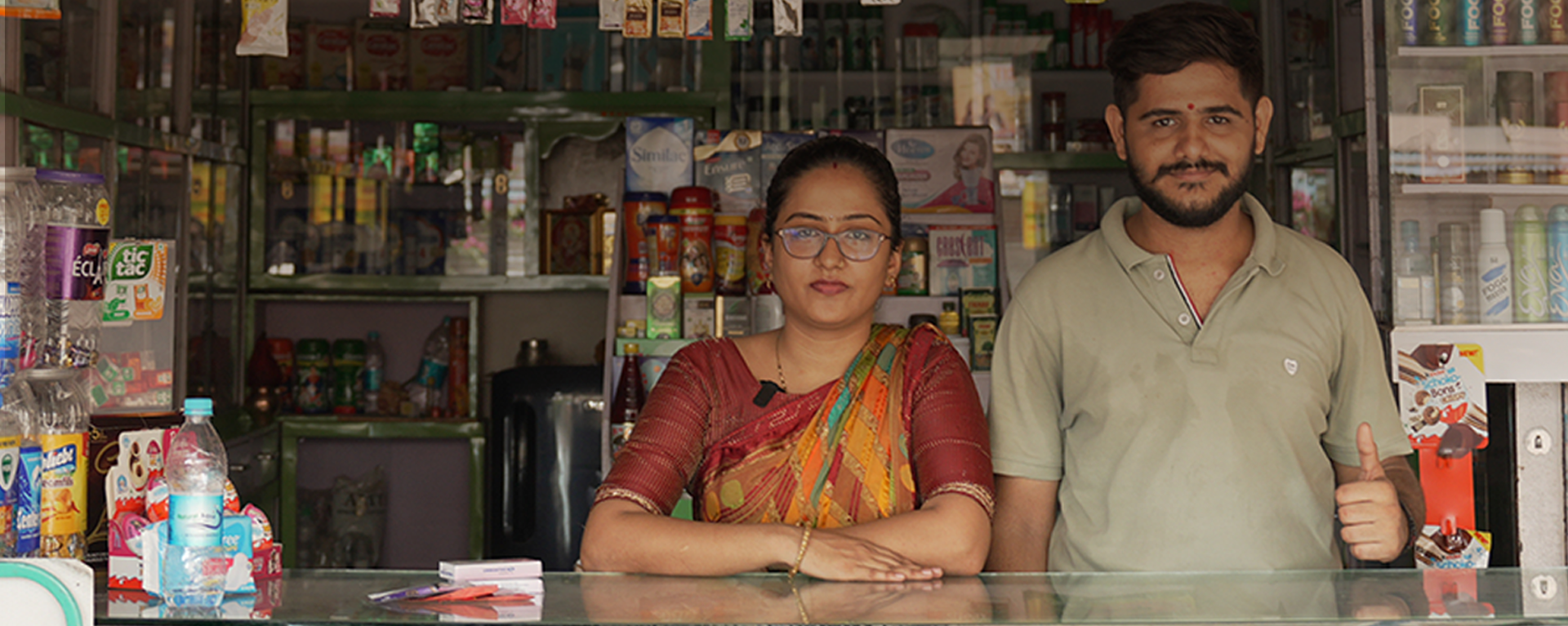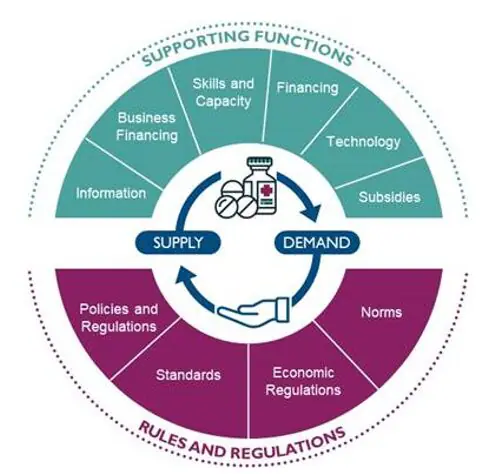
Building Strong Partnerships to Support Women’s Health and Livelihoods in India
This blog has been cross posted from the Chemonics International website.
The Women's Health and Livelihood Alliance (WOHLA) empowers women in India through innovative health and economic initiatives, driven by multi-sector partnerships for sustainable development.
Earlier this year, the Chemonics-led Frontier Health Markets (FHM) Engage program in India, in partnership with Samhita’s Collective Good Foundation (Samhita-CGF), launched the Women’s Health and Livelihood Alliance (WOHLA). WOHLA is a multi-stakeholder initiative designed to empower women in underserved communities across India by addressing the intersecting aspects of their health and economic wellbeing.
A Strategic Approach to Women’s Health and Economic Growth in India
WOHLA, co-founded by USAID’s FHM Engage program and Samhita-CGF, is a transformative initiative aimed at empowering women in underserved communities across India. The initiative addresses the interconnected aspects of women’s health and economic well-being, with a focus on young women aged 19 to 29 from lower and middle-income backgrounds in urban and peri-urban areas.
Operating as a marketplace model, WOHLA fosters capacity, networks, and partnerships to sustainably support women’s health, livelihoods, and leadership roles. It aims to improve health outcomes by providing access to quality sexual and reproductive health (SRH) services, including contraceptives, to prevent unplanned pregnancies and reduce school/college dropout rates. WOHLA’s multi-sectoral approach leverages resources and overcomes policy barriers through effective coordination between private and public sectors. Every $1 invested in women’s health is projected to yield $3 in economic growth, highlighting the initiative’s potential to drive substantial economic and social change in India.
With India’s formal female labor force participation rate at 33%, significantly lower than the global average of 49%, enhancing women’s participation in the workforce is critical. A recent Barclays report suggests that for India to achieve 8% GDP growth in the next five years, female workforce participation needs to exceed 50% of the new workforce by 2030. By improving health outcomes and enabling success in livelihood opportunities, WOHLA aims to address these challenges, ultimately contributing to broader economic growth. WOHLA’s initial efforts are concentrated in Assam, Delhi, Karnataka, Maharashtra, and Meghalaya, with plans to expand to additional priority areas. The long-term goal is to extend WOHLA’s impact nationwide, reaching young women across India with tailored interventions.
Innovative Strategies for Health and Economic Empowerment
Millions of women in India lack access to contraceptive methods, leading to unintended pregnancies, unsafe abortions, and related health risks. Although the unmet need for contraception has declined from 12.9 percent (2016-17) to 9.4 percent (2019-21), one in five young women aged 15 to 24 still need options to space or limit births. This highlights the necessity for diverse contraceptive methods that can be accessed without embarrassment, fear of side effects, or lack of comprehensive information.
WOHLA is designed to transform young women from recipients of subsidized benefits to empowered customers and community leaders. This holistic approach provides access to customized information, affordable products and services, various financing options, and government schemes and subsidies for both healthcare and livelihood inputs.
Samhita-CGF collaborates with diverse domestic partners in health and adjacent sectors to align with WOHLA’s goals. Founding partners FHM Engage and Samhita-CGF manage WOHLA, providing technical assistance and funding to co-design market development interventions. WOHLA also blends funds from USAID’s Family Planning and Reproductive Health Program with matching grants from non-USAID sources to support reproductive health and economic empowerment.
WOHLA ensures key domestic market players have access to reliable market intelligence, enabling the distribution of a broader range of contraceptive products tailored for Indian youth. Partnerships with manufacturers like Senador Labs, Organon, and Pregna diversify suppliers for hormonal contraceptives. Digital innovations from partners Nivi and Appreciate broaden access points, and other development partners are encouraged to leverage these partnerships to improve targeting in rural and urban areas, stimulating market growth.
An advisory committee is being set up to support network capitalization to mobilize large financial contributions and build high-impact coalitions and partnerships. Carefully selected implementation partners, including NGOs working in social inclusion for women, Common Service Centers (which are established by the Indian government to serve as vital access points for a wide range of public utilities, social welfare schemes, healthcare, financial, educational, and agricultural services in rural and remote areas), and corporate workplaces, help to align women’s health and livelihood initiatives. These partners facilitate access to information around contraceptive choices available ensuring voluntarism, linkages to obtaining products and services, coordinate sourcing and local infrastructure, and ensure effective and sustainable execution of WOHLA’s objectives. These strategies will collectively foster sustainable support for women’s health, livelihoods, and leadership, creating a holistic and supportive marketplace model for women in India.
The Power of Partnerships: Insights from WOHLA’s Journey
Both government and private sectors often hesitate to invest in family planning due to perceived limited or uncertain returns and concerns about public perception. Many USAID Family Planning and Reproductive Health Program countries seek strategies to align government and private sector efforts around women’s health, demonstrating how investments in family planning can strengthen systems for inclusive social and economic prosperity. The interplay between women’s economic empowerment and health demands a cohesive approach. Given the critical role of family planning and reproductive health in women’s economic engagement, ensuring access to a range of contraceptive choices is paramount.

Figure: A visual depiction of a market development approach.
In designing WOHLA, we intentionally followed a (MDA) with user-centered design and engaging contraceptive market actors and marginalized young women in USAID and FHM-Engage-identified geographies. The MDA allows us to understand the market system, identify root causes of market under performance (focusing on stewardship; financing; rules, regulations, and norms; and market information), and develop context-specific and locally informed strategies and solutions to systematically change market environments and health markets. The MDA is co-implemented with local agencies and other local health market actors from both public and private sectors to support the co-design of contextually relevant and sustainable market solutions.
For the WOHLA MDA, we held root-cause analysis meetings and workshops within local communities, involving multiple stakeholders such as government representatives, NGOs, corporates, supply chain actors, and philanthropies, to understand their challenges regarding access to healthcare products and services, as well as livelihood opportunities. These discussions significantly influenced the analysis of market failures, and co-design solutions with local market actors, including setting strong selection criteria for identifying champions and program participants, to develop interventions that would achieve the healthy market vision of growth, equity, and sustainability.
Investing in compelling content to showcase program impact and leveraging targeted communication campaigns via digital media platforms has enhanced stakeholder awareness, which is crucial for securing ongoing funding and support for SRH initiatives. Inclusive stakeholder discussions fostered a deeper understanding of underserved communities’ needs, facilitating collaborative solutions and building trust among diverse stakeholders for effective program implementation.
Banner image caption: Bhagu Ashok Patel (left), 27, and Ashok Uttam Patel (right), 25, certified pharmacists and co-owners of Laxmi Medical Store in Dombivali, Maharashtra, have been married for 1.5 years. Together, they are dedicated to the future of their pharmacy and their professional growth. Bhagu takes pride in counseling and advising young girls and women on menstrual hygiene and sexual wellness products, helping them make informed purchase decisions. Credit: FHM Engage.
About the authors:
Dr. Amit Bhanot has served as project director, technical expert, and quality improvement specialist on several multimillion dollar interventions for family planning/ reproductive health, maternal newborn child health, HIV, tuberculosis, and noncommunicable diseases, including exploring blended finance models such as the Utkrisht Development Impact Bond in India. With 20 years of experience, he has worked across more than 12 countries in Asia and Africa, and 17 states in India, with six years in the for-profit private sector (including Palladium Group), 12 years in international not-for-profits (PSI and CHAI), and four years with the Indian Government Health Service.
Priya Naik is the Founder and CEO of Samhita, an impact catalyst, alliance builder, and India’s largest blended finance facility that collaborates with companies, government, financial institutions, philanthropic organizations, NGOs, and social enterprises to deliver national scale impact. Samhita and its nonprofit arm, Collective Good Foundation, have impacted 16 million individuals and intend to double the incomes of 10 million additional workers and entrepreneurs with a focus on women. Priya has a master’s degree in economics from Yale University, a master’s degree in public policy from the University of Michigan, and a master’s degree (and a Gold Medal) in Commerce from Mumbai University.
Recent Highlights
-
Written by : Dr. Amit Bhanot, Priya Naik
-
Published on : 11-Mar-25
- Highlight Type : Blog
- Country : India
- Project : FHM Engage
- Language : English

